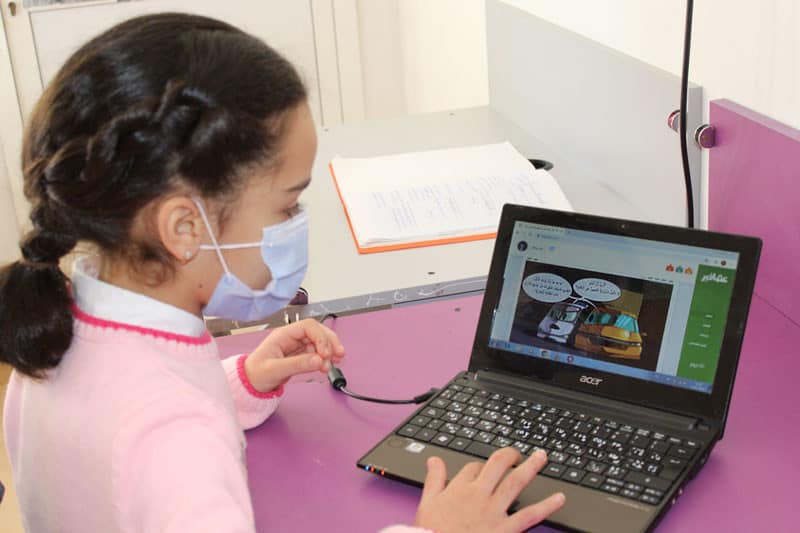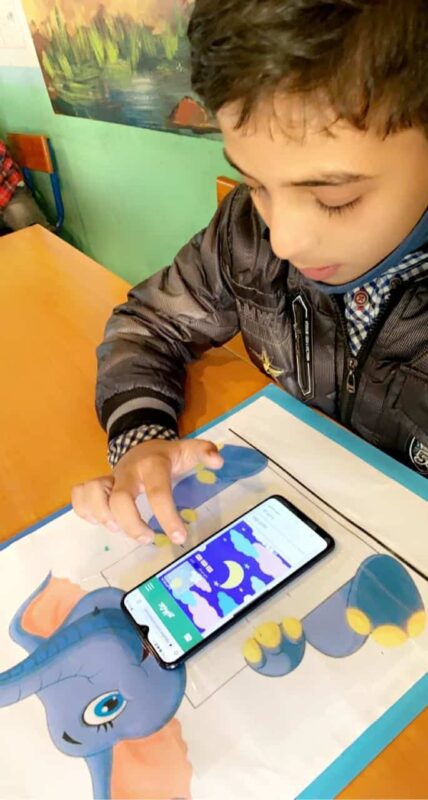As we mark International Day of Education, we celebrate the resilience of teachers, students and education partners who have adapted to the challenges posed by COVID-19. In Morocco, schools were shuttered from March to September 2020, disrupting children’s classroom education. Students and teachers are excited to be back in the classroom and are adapting to a new normal — one with masks, social distancing, hand sanitizer dispensers and new learning materials.
While schools were closed, the USAID Reading for Success – National Program for Reading (RFS-NPR) worked with a group of Moroccan education and Arabic language experts to curate a collection of 100 colorful, age-appropriate and interactive stories. The stories are specifically tailored to students’ reading levels and to the Moroccan context.
When children read the stories, they see themselves reflected in the characters and feel a sense of belonging after a period marked by distance and isolation.
Mohammed Abdellaoui, a Director in one of the pilot schools in Temara, near Rabat, notes, “The stories are very attractively designed, and their content is well adapted to students’ levels, diversity and Moroccan culture.”
RFS-NPR has distributed nearly 24,000 printed copies of the 100 story titles to its 90 pilot schools. Students are eager to pull the books off the shelves and engage in reading new stories outside of their assigned textbooks.

In a first for Moroccan schools, the Ministry of Education set aside time for students to enjoy these new materials and read independently. In November 2020, the Director of Curriculum mandated that the pilot schools dedicate 30 minutes per week for reading enrichment in the classroom. RFS-NPR has conducted a series of trainings for school directors and teachers to equip and inspire them with strategies for how to use the new storybooks.
With the wide variety of exciting stories and dedicated reading time in the classroom, RFS-NPR expects Moroccan children will build their vocabularies, improve reading outcomes, and develop a stronger love of reading and learning.
COVID-19 made clear the value of education — and the importance of remote learning opportunities. To reach students at home, RFS-NPR partnered with education technology company 3asafeer to make these same stories available online.
Whether students are out of school for any reason or if they just want to read for practice or fun, they can access high-quality materials at home through a computer or mobile phone. For many children, it may be the only opportunity to read at home.
“The 3safeer platform is going to solve the enormous issue of the lack of reading materials at home,” says Abdellaoui. “We will be reaching out to parents on the importance of free reading in supporting school learning and improving students’ learning performance.”
Through 3asafeer, the stories come to life with audio recordings, cartoon video lessons, worksheets, comprehension quizzes, and educational games. To date, the platform has granted unique login codes to more than 23,000 students and 835 teachers from the pilot schools.
Just as they have taken to the print books in their classrooms, students are excitedly exploring all that 3asafeer has to offer while at home. Within the span of a week, fourth-grader Nizar Al-Tijani read 90 of the 100 stories on the platform and completed all the related exercises.

Because Nizar does not have many books at home, the online stories have opened a door for his continued and self-guided learning. His parents say the platform is also helping their shy son to open up.
“Having access to this digital library is the best thing that happened to my son,” says Nizar’s father, Mohammed Tijani. “When we were granted access to the 3asafeer library, he would wait for me to come back from work every day to pick up my cell phone and spend hours reading and practicing. His mom and I noticed that he is more joyful and talkative than ever.”
In addition to making time for independent reading during the school day, teachers are incorporating the online and print stories into their teaching. Nadia Rochdi, Nizar’s teacher at Oum El Mouminine school in Inezgane, uses conversations about the stories to encourage Nizar’s oral communication. She is excited to see Nizar not only embrace a love of reading but also begin to grow in his confidence and self-expression.
“I was amazed by Nizar’s achievement, and I am now trying to help him trust himself more and have the courage to speak up,” she says. “Nizar has a strong determination to satisfy his thirst and love for reading. When I discovered his performance, I promised myself I would work on his oral communication issues. I let him tell his friends the stories he has read and explain how the platform is fun and easy to use. I can see how he is improving.”
Kathleen Wilson is the Project Manager for the Reading for Success-National Program for Reading. Mounya El Asri is the program’s Communications Specialist.